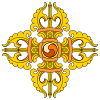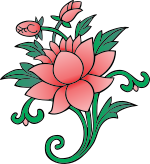
Back Шингон Bulgarian শিঙ্গোন বৌদ্ধধর্ম Bengali/Bangla Shingon (budisme) Catalan Šingon Czech Shingon CY Shingon Skolen Danish Shingon-shū German Ŝingono EO Budismo shingon Spanish Shingon ET

| Part of a series on |
| Buddhism in Japan |
|---|
 |
| Part of a series on |
| Vajrayana Buddhism |
|---|
 |
| Part of a series on |
| Mahāyāna Buddhism |
|---|
 |
| Part of a series on |
| Buddhism |
|---|
 |
Shingon (真言宗, Shingon-shū, "True Word / Mantra School") is one of the major schools of Buddhism in Japan and one of the few surviving Vajrayana lineages in East Asian Buddhism. It is sometimes also called Japanese Esoteric Buddhism, or Eastern Esotericism (Dōngmì, 東密). The word shingon is the Japanese reading of the Chinese word 真言 (zhēnyán),[1] which is the translation of the Sanskrit word mantra.
The Zhēnyán lineage was founded in China (c. 7th–8th centuries) by Indian vajrācāryas (esoteric masters) like Śubhakarasiṃha, Vajrabodhi and Amoghavajra. These esoteric teachings would later flourish in Japan under the auspices of a Buddhist monk named Kūkai (空海, 774–835), who traveled to Tang China and received these esoteric transmissions from a Chinese master named Huiguo (746–805). Kūkai established his tradition at Mount Kōya (in Wakayama Prefecture), which remains the central pilgrimage center of Shingon Buddhism.
The practice of the Shingon school stresses that one is able to attain "buddhahood in this very body" (sokushin jōbutsu) through its practices, especially those which make use of the "three mysteries" (Jp: sanmi 三密) of mudra, mantra and mandala.[2][3] Another influential doctrine introduced by Shingon was the idea that all beings are originally enlightened, a doctrine that was known as hongaku.[4]
The Shingon school's teachings and rituals had an influence on other Japanese traditions, especially those of the Tendai school, as well as Shugendo and Shinto.[5] Its teachings also influenced the ritual repertoire of Japanese Zen, including Soto Zen (through the figure of Keizan).[6] Shingon Buddhism also influenced broader Japanese culture, including medieval Japanese aesthetics, art, and craftsmanship.[7]
- ^ "Zhēnyán". Cengage – via Encyclopedia.com.
- ^ Hakeda (1972), p. 6
- ^ Orzech (2011), p. 85
- ^ Hakeda (1972), p. 6
- ^ Hakeda (1972), pp. 5-8
- ^ Taigen Dan Leighton; Shohaku Okumura (1996) Dogen's Pure Standards for the Zen Community: A Translation of Eihei Shingi, p. 23. SUNY Press.
- ^ Hakeda (1972), p. 4-5